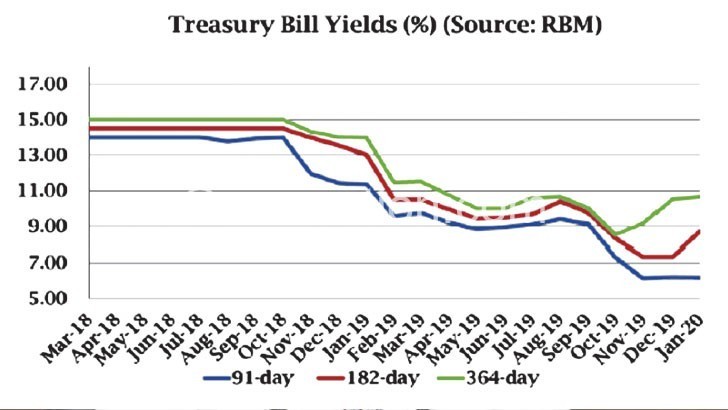‘Reference rate could decline further’
Commercial bank’s reference rate may moderate to about or below 12 percent in the short-term due to the continued lower Treasury bill yields (T-bill), Nico Asset Managers has projected.
Presently, on average, all-type Treasury bill yields are declining with data showing in January they stood at 8.52 percent from 12.79 percent in January 2019.

The projection by Nico Asset Managers comes at a time the reference rate has largely remained firm at about 13.4 percent since the Reserve Bank of Malawi (RBM) last revised the policy to the current 13.5 percent, a development that has helped push up private sector credit by 21.3 percent..
“The reference rate for the month of January 2020 was 13.1 percent while that of February 2020 increased to 13.4 percent. The increase was likely a result of an increase in interbank rate for the month of January 2020 which increased to 13.75 percent compared to 12.58 percent recorded in December 2019,” said the firm in its monthly economic report for January.
But should the reference rate be as projected by Nico Asset, the lower lending rates would reduce the cost of borrowing, thus stimulate private sector activity, resulting in economic growth.
Alliance Capital Limited research manager Bond Mtembezeka observed in an interview that there are indications that the reference rate later will come down in the short term as both the interbank rate and T-bill yields have come down.
“So far the average interbank rate is 13.3 percent and if the high liquidity levels that we have experienced prevail then definitely the reference rate should come down,” he said.
At its first 2020 Monetary Policy Committee meeting last month, RBM maintained the monetary policy rate at 13.5 percent.
In arriving at the decision, the monetary authorities looked at the current economic trends and the rise in inflation to be temporary not to warrant any adjustment.
RBM Governor Dalitso Kabambe in the first monetary policy report indicated that the adopted policy stance is deemed adequately tight to deal with emerging risks while also aiding the growth momentum.
The reference rate for the month of January 2020 was 13.1 percent while that of February 2020 increased to 13.40 percent.





